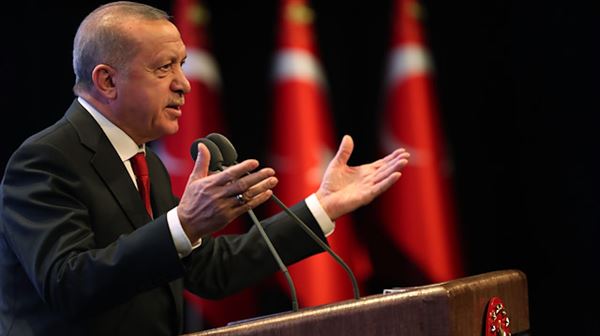Awarding the Nobel Prize to Peter Handke will only encourage “enemies of Islam and humanity”, the Turkish president said on Tuesday. Recep
Awarding the Nobel Prize to Peter Handke will only encourage “enemies of Islam and humanity”, the Turkish president said on Tuesday.
Recep Tayyip Erdogan’s remarks came at a commemoration event at the presidential complex in the capital Ankara to mark the 75th year of Ahiska Turks’ exile.
“It is a shame and disgrace to award a person who defends and praises a murderer who shed the blood of tens of thousands of Muslims,” Erdogan said, referring to the 2019 Nobel Laureate in Literature Peter Handke, an Austrian writer who is accused of denying the 1995 Bosnian genocide.
Handke is known to be a great admirer of former Serbian leader Slobodan Milosevic, who died in 2006 while facing trial in The Hague for war crimes and genocide.
“Stand up if you support the Serbs,” Handke wrote during the 1998-1999 Kosovo War.
He claimed that the Muslim Bosniaks in Sarajevo had killed themselves, adding that he never believed that the Serbs had committed genocide in Srebrenica.
Handke also visited Milosevic in prison and tried to testify in his favour.
“I am here for Yugoslavia, for Serbia, for Slobodan Milosevic,” Handke said in a 2006 eulogy for Milosevic.
In winning the prize, Handke will also receive 9 million Swedish kronor ($952,000) as well as a medal and a diploma.
Turkish president called on people of conscience to react over the controversial award.
“Those lecturing Turkey about democracy and law rolled out the red carpet for dictators and terrorists who killed tens of thousands of people,” said Erdogan.
-550,000 Ahiska Turks away from homes
Recalling that almost 550,000 Ahiska Turks have been living away from their homes, Erdogan said that upcoming projects would enable the Ahiska music, folklore, culture and art to reach more people.
He said the Ahiska Turks’ heirloom architectural works should not be allowed to fade away.
“We must struggle to protect our common historical heritage and to transfer it to the future generations through restoration works,” Erdogan said, adding that every disowned piece that is lost and destroyed also takes a piece of the memory.
Turkish president said that the Soviet administration sent Ahiska Turks — without distinction between women, the elderly or children — to labor camps.
“In these camps, thousands of our Ahiska brothers and sisters were the victims of the cold [weather] and inhuman treatment.”
Also speaking at the event, Ziyatdin Kassanov, head of World Union of Ahiska Turks, recalled that about 100,000 Ahiska Turks were exiled to areas in Central Asia, nearly 40,000 others were recruited by the Soviet military services.
Kassanov said almost half of the 17,000 Ahiska Turks who were sent to war areas could never manage to come back.
“They massacred us but thank God we still haven’t forgotten our language, religion and traditions,” he added.
On Nov. 14, 1944, more than 92,000 Ahiska Turks — including children, women and elders — were deported from their ancestral lands in the Ahiska region of Georgia to remote areas of the then Soviet Union.
Scattered across nine countries with a total population of around 500,000, the Ahiska Turks are now hopeful for the future thanks to Turkey’s efforts that bore fruit.
